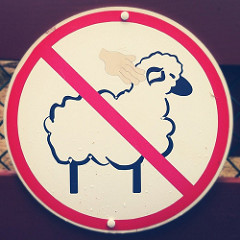In a widely read and commented upon blog post, Nigel Barber examines some of the evidence and trends related to atheism and the decline of religion. Barber closes his thought-provoking post with the following:
"The reasons that churches lose ground in developed countries can be summarized in market terms. First, with better science, and with government safety nets, and smaller families, there is less fear and uncertainty in people's daily lives and hence less of a market for religion. At the same time many alternative products are being offered, such as psychotropic medicines and electronic entertainment that have fewer strings attached and that do not require slavish conformity to unscientific beliefs."

It is true that much of the developed world lives in not only a post-Christian, but a post-religious society. And it is true that many people have turned to religion because of economic uncertainty or emotional challenges. They still do, in fact.
However, for many people, religion is not merely a way to deal with fear, uncertainty, and emotional difficulties. In my experience, many people follow a particular religious way of life because they believe that it is true. The problem with a market-based analysis of the future of religion, as well as the market-based practices present in many contemporary religious communities, is that religion at its best is not a consumer product. Rather, at its best religious faith calls for sacrifice, unselfishness, and love. In order to be willing to live in such a way, a self-centered market-based approach to religion will not do. Rather, one must believe that she is living in a way that is consistent with reality in order to motivate an unselfish approach to life.
It is also unclear how atheism is positioned to replace religion, in the following way. Atheism is the belief that no God or gods exist. But this, in and of itself, cannot form the foundation for a way of life. Only by forming and practicing positive beliefs and values can one build a coherent and meaningful life. So if something is to replace religion, it will not be atheism. Perhaps some form of secular humanism will accomplish this task.
But here we run into another problem, namely, that human beings long for transcendence of some sort, as shown by the presence and prevalence of religious belief throughout cultures across time. This does not guarantee the truth that there is some transcendent realm, but it highlights a problem for supplanting religion or spirituality with "better science...government safety nets...psychotropic medicines and electronic entertainment."
We must remember that religion is not merely about making my life better. Religion at its best is about making me better, and a better contributor to the common good. One need not be a religious person, of course, to become a better person and make such a contribution. Whether or not we are religious, we should be committed to growing in character and doing what we can for others. But we must ground such commitments in positive beliefs about the nature of reality in order to sustain them over the long haul.
Image from Kevin Baird, CCL
